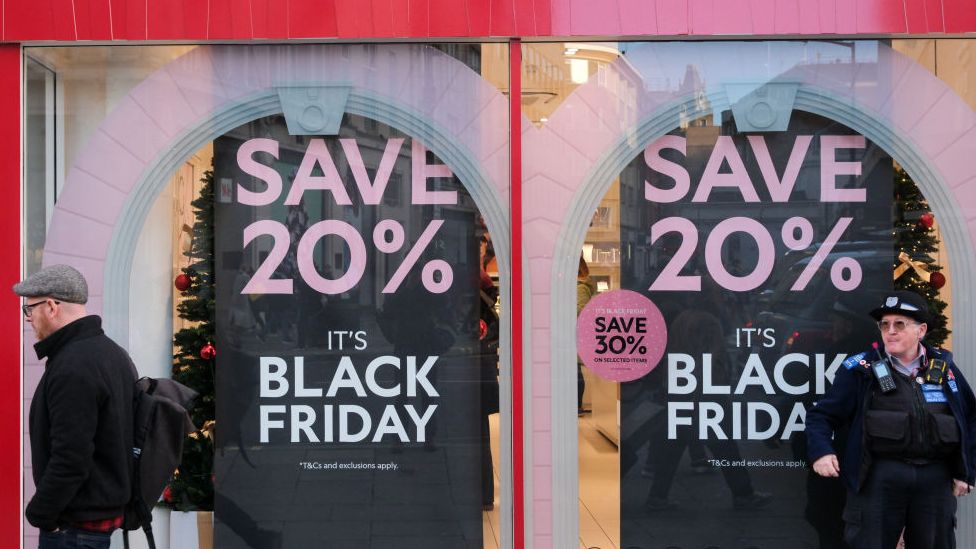
Retail sales saw a surprise fall last month after Black Friday failed to give its expected boost to online shopping.
With household budgets remaining under pressure from rising prices, sales volumes dropped 0.4% in November, official figures showed.
The fall could be bad news for some stores, which are entering a crucial time of the year for sales.
However, there were signs people were buying Christmas food early in order to spread the cost of the festive season.
Sales at food stores rose 0.9% last month with people “stocking up early” for Christmas, the Office for National Statistics (ONS) said.
Research carried out for the BBC has suggested Christmas dinner will be nearly 22% more expensive this year than in 2021.
“Retail sales fell overall in November, driven by a notable drop for online retailers, with Black Friday offers failing to provide their usual lift in this sector,” said ONS director of economic statistics Darren Morgan.
But he pointed out that department stores had reported better sales, with bosses saying a longer Black Friday sales period had drawn in more customers.
Sales at clothing stores rose by 2.1%, the ONS said, mainly due to a better performance from shoe stores.
The figures suggest shoppers are “focusing on essentials like food and footwear”, said Kevin Bright, an analyst at McKinsey & Co.
The UK is predicted to face its biggest drop in living standards on record as wages struggle to keep up with rising prices.
Figures out this week showed prices went up by 10.7% in the year to November, indicating the cost of living is still rising at its fastest pace for about 40 years.

Melanie Thompson, who runs a wine and cheese shop at the Piece Hall in Halifax, said people were being more careful about what they spend.
“Before, people might have bought a full case of wine. Now they’re buying one or two bottles and using up some of the spirits they have at home,” she added.
The shop has also seen a mixed effect from the recent train strikes, with fewer customers from further away, but more locals visiting.
Retail analyst Natalie Berg said it was no surprise that Black Friday had been a “damp squib”.
“The appeal of Black Friday has also been diluted because shoppers have cottoned on to the fact that it’s a manufactured event and prices are not always at their lowest on the day,” she said.
“The problem is exacerbated by the fact that retailers are sitting on a lot of inventory right now, so we’ve seen a constant stream of discounts since September.”
Sales volumes are still below pre-Covid levels, according to the ONS, and the boss of the Waterstones bookshop chain, James Daunt, told the BBC most retailers were still “probably expecting 2023 to be a time to batten down and concentrate on the basics because it is going to be tough”.
Shoppers have less money to spend because they are dealing with higher energy bills and higher interest rates, he added.
“In our case, books do very well and continue to be resilient, but we also rely on our neighbours being full of people and the general health of retail footfall. When everything is going down, everyone suffers a bit,” Mr Daunt told the BBC’s Today programme.

Non-store sales – which mainly covers online retailers – fell by 2.8% last month, the ONS said. This figure has been declining for some time since Covid restrictions were lifted and people could return to shops, although online sales still remain well above pre-pandemic levels.
But the chairman of toy retailer The Entertainer, Gary Grant, told the BBC that worries over postal strikes and the weather had led to “a swing from the web sales to our shops”.
“If I was buying anything for my grandchildren this Christmas, I think I’d be strolling down the High Street and walking out of the shop with it under my arm knowing there’s no worry about the carton arriving,” he said.
Earlier this week, a retail group and Waterstones advised people to use stores rather than rely on online shopping if they want to get Christmas gifts on time.
Retail sales had been expected to rise last month, so the surprise fall is not a good sign for the Christmas trading period, which is the most important time for many shops.
Mr Grant said a quarter of The Entertainer’s annual sales take place in one month, and next week will account for 8% of its entire year’s turnover.
Jacqui Baker, head of retail at consultancy firm RSM, said industrial strikes and extreme weather had created “further barriers for consumers to splurge”.
“It’s likely to be a disappointing end to the year for the retail sector,” she added.